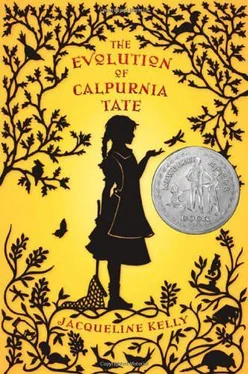Jacqueline Kelly - The Evolution of Calpurnia Tate
Здесь есть возможность читать онлайн «Jacqueline Kelly - The Evolution of Calpurnia Tate» весь текст электронной книги совершенно бесплатно (целиком полную версию без сокращений). В некоторых случаях можно слушать аудио, скачать через торрент в формате fb2 и присутствует краткое содержание. Город: New York, Год выпуска: 2009, ISBN: 2009, Издательство: Macmillan : Henry Holt and Company, Жанр: Детская проза, на английском языке. Описание произведения, (предисловие) а так же отзывы посетителей доступны на портале библиотеки ЛибКат.
- Название:The Evolution of Calpurnia Tate
- Автор:
- Издательство:Macmillan : Henry Holt and Company
- Жанр:
- Год:2009
- Город:New York
- ISBN:978-0-8050-8841-0
- Рейтинг книги:5 / 5. Голосов: 1
-
Избранное:Добавить в избранное
- Отзывы:
-
Ваша оценка:
- 100
- 1
- 2
- 3
- 4
- 5
The Evolution of Calpurnia Tate: краткое содержание, описание и аннотация
Предлагаем к чтению аннотацию, описание, краткое содержание или предисловие (зависит от того, что написал сам автор книги «The Evolution of Calpurnia Tate»). Если вы не нашли необходимую информацию о книге — напишите в комментариях, мы постараемся отыскать её.
The Evolution of Calpurnia Tate — читать онлайн бесплатно полную книгу (весь текст) целиком
Ниже представлен текст книги, разбитый по страницам. Система сохранения места последней прочитанной страницы, позволяет с удобством читать онлайн бесплатно книгу «The Evolution of Calpurnia Tate», без необходимости каждый раз заново искать на чём Вы остановились. Поставьте закладку, и сможете в любой момент перейти на страницу, на которой закончили чтение.
Интервал:
Закладка:
This was true. Our lessons had started again, and I knew I’d have to make up the practice, plus an additional half hour as punishment. That was the rule, but I didn’t care. The day had been worth it. The day had been worth a thousand extra hours at the piano.
We went into the house, and Granddaddy put the hummingbird’s nest in a tiny glass box and gave it to me. Then I left him pottering about in the library and went off to plead my case before Mother, to no avail.
I managed to cram my piano punishment in before dinner, playing with a light heart and a sure, spirited touch, if I do say so myself. I went to bed that night exhausted and exhilarated, the hummingbird nest in its neat glass box on my dresser next to my hairpins and ribbons.
A week later, my morning list looked like this:
5:15 a.m., clear and fine, winds from the south
8 rabbits (7 cottontail, 1 jack)
1 skunk (juvenile, appears lost)
1 possum (notched left ear)
5 cats (3 ours, 2 feral)
1 snake (grass-type, harmless)
1 lizard (green, same color as lily stems, vy hard to spot)
2 red-tailed hawks
1 buzzard
3 toads
2 hummingbirds (Rufous?)
assorted untallied Odonata, Hymenoptera, Arachnidae
I showed it to Granddaddy, who nodded his approval. “It’s amazing what you can see when you just sit quietly and look.”
Chapter 3
THE POSSUM WARS
Seedlings from the same fruit, and the young of the same litter, sometimes differ considerably from each other, though both the young and the parents . . . have apparently been exposed to exactly the same conditions of life. . . .
THE POSSUM WARS had started up and were, once again, raging around the back porch. That is, as much as a war of passiveness and inaction could be said to rage. This presented me with an excellent field of study, since every night the battle always played out exactly like this: A portly, dusty possum emerged from under the house to forage for his nocturnal breakfast of kitchen scraps and whatnot. He was inevitably surprised by one of the Outside Cats that patrolled the back porch as part of her domain. The cat and the possum stared at each other with big, round eyes of mutual shock, and then the possum groaned and slumped to the ground. He lay there on his side, motionless and stiff, his grimacing mouth exhibiting tiny needle teeth. His eyes were fixed, his whiskers frozen. He presented the very picture of Possum Death.
The cat, always freshly amazed by this display, looked on in wonder. She approached the corpse with caution and tentatively sniffed the ground around him. She then folded herself up into that loaf shape peculiar to cats and regarded her vanquished foe with enormous feline satisfaction, her duty done. After a while, she got bored and wandered off to the kitchen door, hoping to cadge a handout from Viola. The corpse lay in state for another five minutes and then, without warning or ceremony, lurched to his feet and casually strolled off in search of his own meal.
This scene played night after night, all summer long. Neither I nor the adversaries ever fatigued of it. How satisfying to have a bloodless war in which each side was equally convinced of its own triumph.
Every morning, the possum returned at five o’clock sharp. He made his way back under the house and climbed up into the wall beside my bed. His scuffling woke me as dependably as any alarm clock, my five o’clock possum. I didn’t tell anyone about him because if Mother found out she would send SanJuanna’s husband, Alberto, under the house to stop up the hole and set a trap. But I didn’t begrudge the possum his home in ours. (Question for the Notebook: How is it that the possum knows the exact time?)
I asked Granddaddy about this. He said seriously, “Maybe he carries a watch in his pouch like Alice’s rabbit.”
“Oh, yes,” I said, trying not to smile and failing. I wrote this in my Notebook so that I’d remember to tell my best friend, Lula Gates.
ONE EVENING while Granddaddy fiddled with his formula for making liquor from pecans, I sat on a tall stool at his elbow and watched him work. He had hung a dozen or so kerosene lamps from the ceiling at various heights around the old slave quarters, and you had to watch your head. The lamps filled the small space with a dancing yellow light. Mother was terrified the place would go up in flames, and she made Alberto keep big buckets of damp river sand in each corner. The windows had no glass, just flaps of gunnysack strung up in a futile attempt to keep out the insects. It was a paradise for moths.
Granddaddy had been working for years on a way to distill pecans into liquor. The experiment itself didn’t interest me, but his company was never boring. We talked as he worked. I handed him things, and I sharpened his pencils, which he kept in a shaving mug.
He tended to hum cheery scraps of Vivaldi when his work was going well; when it was not going well, he hissed softly through the thicket of his mustache. I picked a moment when he was humming in a major key and said, “Granddaddy, have you always been a naturalist?”
“What was that?” he said. He held a beaker of muddy brown liquid up to the warm, wavering light and put on his spectacles to peer at the thick sediment that settled to the bottom like river sludge. “Oh. No. Not always.”
“Was your grandfather a naturalist, sir?” I said.
“I don’t know,” he said. “I can’t say I knew him. He died when I was a young boy.” He took a sip of the murky liquid and made a face. Distill, sip, grimace. Then he would usually swear. This was his pattern.
“Damn,” he said, “that’s ghastly stuff.”
Progress had not, apparently, been made.
“How old were you when he died?” I said.
“Oh, about five or so, I reckon.” And then, anticipating my next question, he said, “He died of wounds he sustained in a battle against the Comanche in the Oklahoma Territories.”
“Well,” I said, “was he interested in science?”
“Not that I know of. He traded in beaver and buff, but I don’t believe he had anything other than a pure business interest in them. Strain this for me, won’t you? Then put it in one of those bottles and label it with today’s date. Perhaps it will improve with time. It couldn’t possibly get any worse.”
I took the beaker from him and poured the contents through a gauze sieve into one of Mother’s empty Lydia Pinkham’s bottles. Sometimes she could really go through that stuff, especially when my brothers got on her nerves (which was a lot of the time). I stoppered the bottle and marked it with a red grease pencil: JULY 1, 1899. I placed it on a shelf next to its many unsuccessful fellows.
“Then how did you come to be interested in science, sir?” I asked.
He stopped what he was doing and appeared to stare out the window, except that I knew you couldn’t see out through the burlap at night, only in.
After a long moment, he said, “It happened at twilight. Eighteen sixty-five. I remember it as if it were yesterday. Matter of fact, I remember it better than I remember yesterday. Old age is a terrible thing, Calpurnia.” He looked at me and said, “Don’t let it happen to you.”
“Nosir,” I said. “I won’t.”
“I was the commanding officer of a troop of boys dragooned from all over Texas. They were fine horsemen, every one of them raised on horseback. They thought they were going for the cavalry, but it turned out they were meant for the infantry. To spend their days marching. My God, the endless complaining when they found out! You never heard such creative profanity. They despised walking, let alone marching. But despite their protestations, a tougher bunch of boys you never saw.
Читать дальшеИнтервал:
Закладка:
Похожие книги на «The Evolution of Calpurnia Tate»
Представляем Вашему вниманию похожие книги на «The Evolution of Calpurnia Tate» списком для выбора. Мы отобрали схожую по названию и смыслу литературу в надежде предоставить читателям больше вариантов отыскать новые, интересные, ещё непрочитанные произведения.
Обсуждение, отзывы о книге «The Evolution of Calpurnia Tate» и просто собственные мнения читателей. Оставьте ваши комментарии, напишите, что Вы думаете о произведении, его смысле или главных героях. Укажите что конкретно понравилось, а что нет, и почему Вы так считаете.












